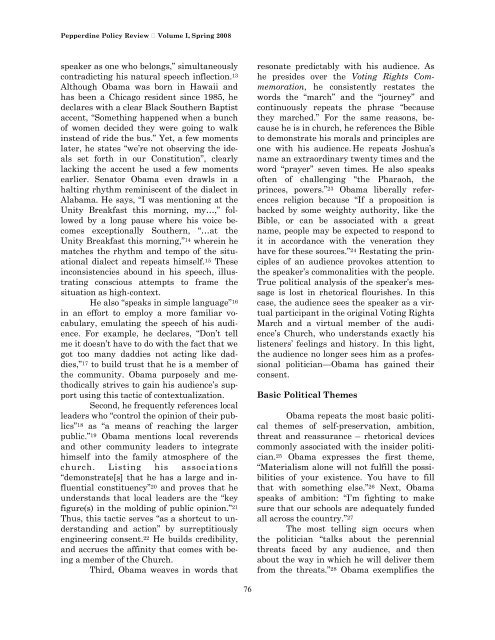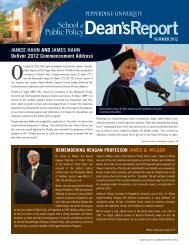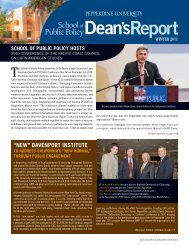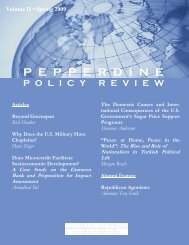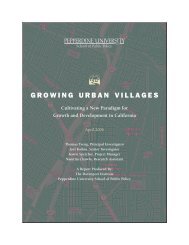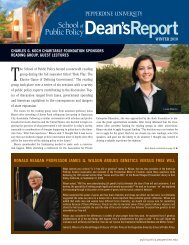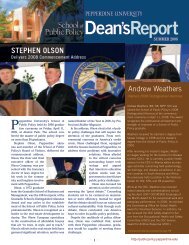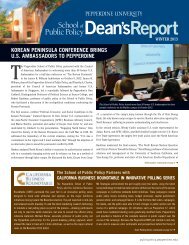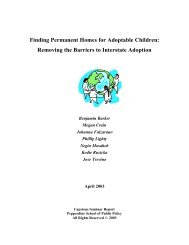Pepperdine University School of Public Policy
Pepperdine University School of Public Policy
Pepperdine University School of Public Policy
Create successful ePaper yourself
Turn your PDF publications into a flip-book with our unique Google optimized e-Paper software.
<strong>Pepperdine</strong> <strong>Policy</strong> Review Volume I, Spring 2008<br />
speaker as one who belongs,” simultaneously<br />
contradicting his natural speech inflection. 13<br />
Although Obama was born in Hawaii and<br />
has been a Chicago resident since 1985, he<br />
declares with a clear Black Southern Baptist<br />
accent, “Something happened when a bunch<br />
<strong>of</strong> women decided they were going to walk<br />
instead <strong>of</strong> ride the bus.” Yet, a few moments<br />
later, he states “we’re not observing the ideals<br />
set forth in our Constitution”, clearly<br />
lacking the accent he used a few moments<br />
earlier. Senator Obama even drawls in a<br />
halting rhythm reminiscent <strong>of</strong> the dialect in<br />
Alabama. He says, “I was mentioning at the<br />
Unity Breakfast this morning, my…,” followed<br />
by a long pause where his voice becomes<br />
exceptionally Southern, “…at the<br />
Unity Breakfast this morning,” 14 wherein he<br />
matches the rhythm and tempo <strong>of</strong> the situational<br />
dialect and repeats himself. 15 These<br />
inconsistencies abound in his speech, illustrating<br />
conscious attempts to frame the<br />
situation as high-context.<br />
He also “speaks in simple language” 16<br />
in an effort to employ a more familiar vocabulary,<br />
emulating the speech <strong>of</strong> his audience.<br />
For example, he declares, “Don’t tell<br />
me it doesn’t have to do with the fact that we<br />
got too many daddies not acting like daddies,”<br />
17 to build trust that he is a member <strong>of</strong><br />
the community. Obama purposely and methodically<br />
strives to gain his audience’s support<br />
using this tactic <strong>of</strong> contextualization.<br />
Second, he frequently references local<br />
leaders who “control the opinion <strong>of</strong> their publics”<br />
18 as “a means <strong>of</strong> reaching the larger<br />
public.” 19 Obama mentions local reverends<br />
and other community leaders to integrate<br />
himself into the family atmosphere <strong>of</strong> the<br />
church. Listing his associations<br />
“demonstrate[s] that he has a large and influential<br />
constituency” 20 and proves that he<br />
understands that local leaders are the “key<br />
figure(s) in the molding <strong>of</strong> public opinion.” 21<br />
Thus, this tactic serves “as a shortcut to understanding<br />
and action” by surreptitiously<br />
engineering consent. 22 He builds credibility,<br />
and accrues the affinity that comes with being<br />
a member <strong>of</strong> the Church.<br />
Third, Obama weaves in words that<br />
resonate predictably with his audience. As<br />
he presides over the Voting Rights Commemoration,<br />
he consistently restates the<br />
words the “march” and the “journey” and<br />
continuously repeats the phrase “because<br />
they marched.” For the same reasons, because<br />
he is in church, he references the Bible<br />
to demonstrate his morals and principles are<br />
one with his audience. He repeats Joshua’s<br />
name an extraordinary twenty times and the<br />
word “prayer” seven times. He also speaks<br />
<strong>of</strong>ten <strong>of</strong> challenging "the Pharaoh, the<br />
princes, powers.” 23 Obama liberally references<br />
religion because “If a proposition is<br />
backed by some weighty authority, like the<br />
Bible, or can be associated with a great<br />
name, people may be expected to respond to<br />
it in accordance with the veneration they<br />
have for these sources.” 24 Restating the principles<br />
<strong>of</strong> an audience provokes attention to<br />
the speaker’s commonalities with the people.<br />
True political analysis <strong>of</strong> the speaker’s message<br />
is lost in rhetorical flourishes. In this<br />
case, the audience sees the speaker as a virtual<br />
participant in the original Voting Rights<br />
March and a virtual member <strong>of</strong> the audience’s<br />
Church, who understands exactly his<br />
listeners’ feelings and history. In this light,<br />
the audience no longer sees him as a pr<strong>of</strong>essional<br />
politician—Obama has gained their<br />
consent.<br />
Basic Political Themes<br />
Obama repeats the most basic political<br />
themes <strong>of</strong> self-preservation, ambition,<br />
threat and reassurance – rhetorical devices<br />
commonly associated with the insider politician.<br />
25 Obama expresses the first theme,<br />
“Materialism alone will not fulfill the possibilities<br />
<strong>of</strong> your existence. You have to fill<br />
that with something else.” 26 Next, Obama<br />
speaks <strong>of</strong> ambition: “I’m fighting to make<br />
sure that our schools are adequately funded<br />
all across the country.” 27<br />
The most telling sign occurs when<br />
the politician “talks about the perennial<br />
threats faced by any audience, and then<br />
about the way in which he will deliver them<br />
from the threats.” 28 Obama exemplifies the<br />
76


